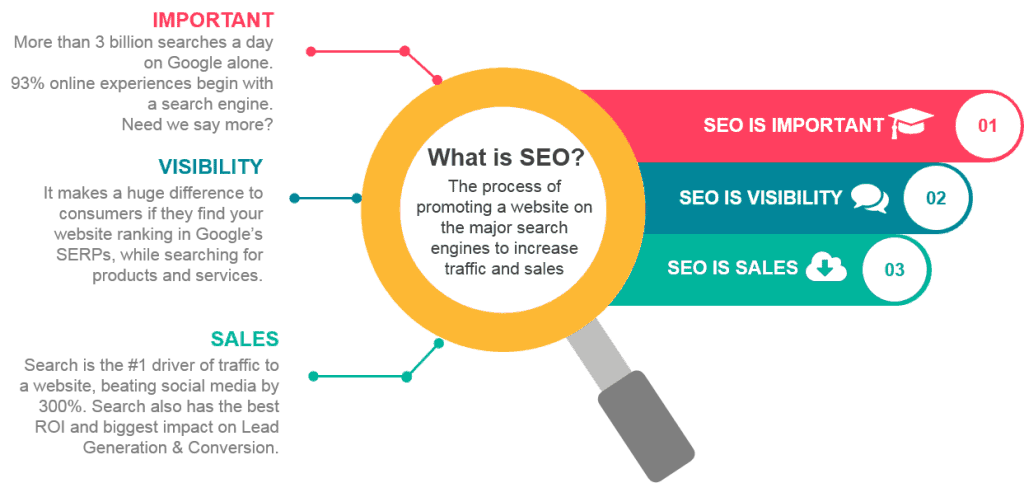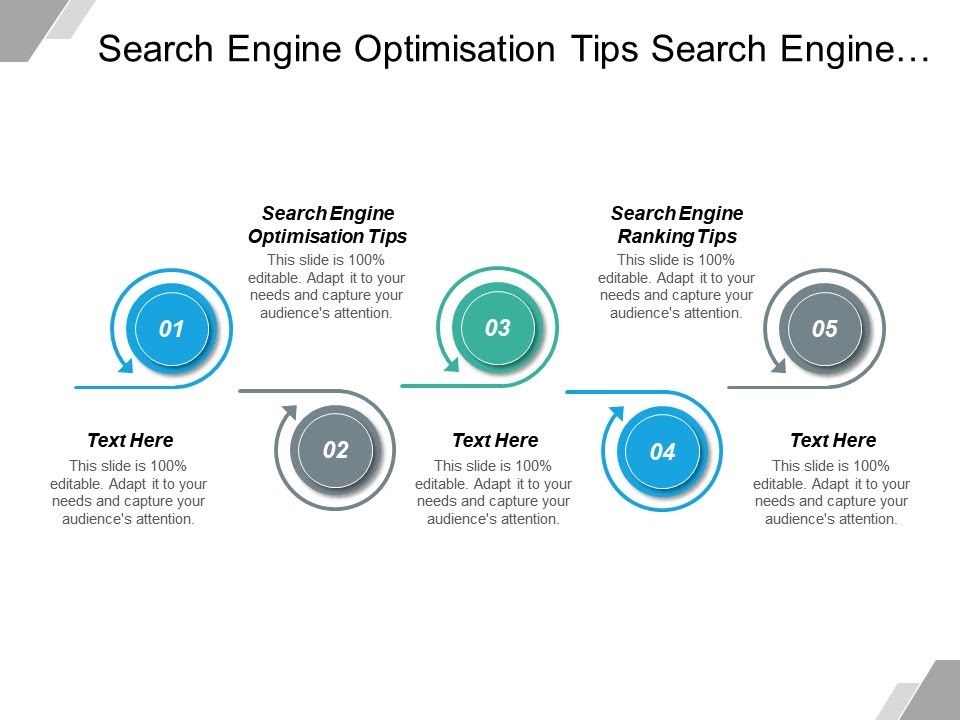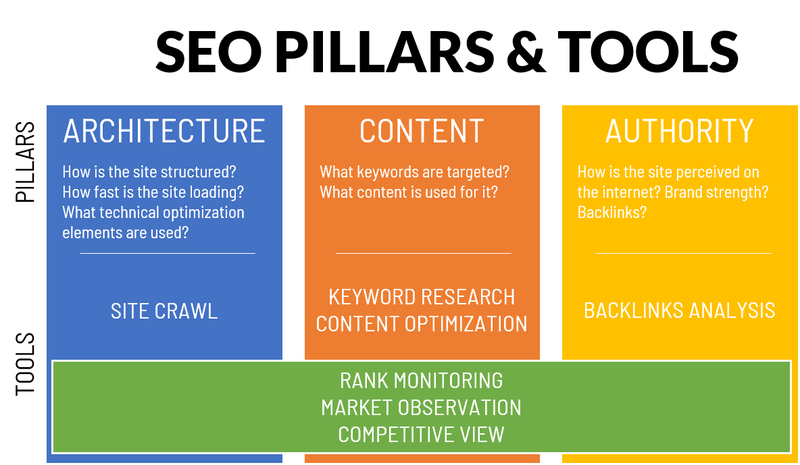
Table of Contents
- Defining SEO
- SEO Facts For the Keen Marketer
- 7 Small SEO Tools for Businesses
“Today, it’s not about ‘get the traffic — it’s about ‘get the targeted and relevant traffic.’” – Adam Audette, Chief Knowledge Officer, RKG
When it comes to marketing a business in today’s digital age, these words from Adam Audette are perhaps the best digital marketing strategy tip any business or marketer can get. They also, in a nutshell, summarize the meaning of SEO.
SEO stands for search engine optimization. It helps businesses get targeted and drives relevant traffic to their websites and other digital assets. With SEO, companies can increase the organic reach for their digital assets, thus helping generate leads that the business doesn’t need to pay for (also called “organic leads”).
Defining SEO
Don’t worry if you are still wondering what SEO is because you are not alone. SEO, to put it in simple words, is the process businesses and marketers use to optimize their websites and other digital assets to make them search-friendly. This increases the website’s search ranking, allowing search engines like Google to recommend the website to consumers for their relevant queries.

SEO Facts For the Keen Marketer
Now that we have defined what SEO is, here are some cool facts about SEO that all marketers and businesses need to know about.
1. There are two key elements when it comes to improving SEO
- The on-page element: The on-page element is your own content that other sites would like to link to. The more the links from other sites, the more search engines realize that people trust your high-quality content.
- The off-page element: The off-page element is usually someone else’s website. This helps make your content relevant by including the keywords for which brands are hoping to rank.
- After content, the most important on-page element for SEO is the title. It is critical to have a catchy and effective page title.
- Despite having a recommended limit of only 155 characters, meta descriptions help with click-through rates for your digital content. It pays to pay special attention to the same.
- As per Search Engine Journal, when it comes to Google and other search engines, the top five results get 75% of the clicks, and the first-page listings get 99% of all the clicks.
It is no wonder that a meme doing the rounds in the marketing circuit some time back read something like, “the best place to hide a dead body is page 2 of the Google Search Results Page (SERP)!”

- Lastly, but most importantly, it takes time for optimized content to show results, which does not immediately offer returns. You need patience and consistency to see returns through SEO.

7 Small SEO Tools for Businesses
It is not enough for businesses to know SEO in digital marketing. Businesses also need to adopt the right SEO tools to improve the search ranking for their digital assets and fulfill what the SEO definition promises.

Here’s our listicle of the seven most recommended SEO tools for businesses.
1. Google Analytics
Google Analytics, Google’s very own free analytics tool, is a must-have to monitor and measure the success of SEO of your digital assets. Once installed properly, all data about your website performance and consumer behavior are just a click away. Google Analytics helps you with details of how visitors use your site, their preferences, the tactics that help drive maximum leads and conversion, and much more.

2. Google Search Console
This free SEO tool from Google helps you find errors on your website through alerts directly from Google. It also helps with detailed analytics on keyword ranking, data related to a website showing up in organic search results, click-through rates for the same, etc. This is one of the most robust analytical tools available to monitor and refine your SEO strategies.

3. Rank IQ
This AI-based tool is built primarily for bloggers and assists them with perfectly optimized content and high-traffic keywords with the lowest competition. Rank IQ learns automatically over time as an AI-based software, thus becoming indispensable for businesses.

4. Screaming Frog
This free SEO spider (for up to 500 URLs per website) is a website crawler tool that helps conduct technical SEO audits on your website. Its USP is that you can execute it immediately. With Screaming Frog, get a detailed audit report on your website highlighting error codes on meta tags and other website details. Good things don’t always come for free, though, if you want to go beyond 500 URLs.

5. Ahrefs
If SEO content opportunities, SEO keyword research, and other SEO-related tasks are at the top of your mind, then Ahrefs is the right tool for you. A site explorer tool, Ahrefs helps view the growth trends of your backlinks and identify all the actual websites that are already linked to your platform. This tool is also ideal if you wish to explore more opportunities for link-building and keep a tab on what your competitors are doing in this space.

6. SEMrush
If there is an all-in-one SEO tool in the market, it must be SEMrush. Be it SEO, competitor research, content marketing, SEO audits, or everything else in between, this one tool pretty much does everything related to SEO for you. You can also handle all your social media marketing with just this one platform.

7. SpyFU
As the name itself suggests, here’s your chance to spy on your competition and see their SEO and Google Ads performance. With this tool, you will see what works for your competition and learn from it to help increase your website traffic and track your keyword ranking to help generate leads on your platform.

Parting Words
While it is very easy to understand the meaning of SEO, executing it to maximize what the SEO definition promises are where most businesses fail. While we have listed some of the top SEO tools to help businesses, marketers, and bloggers alike, this is not its be-all-and-end-all.
If used correctly, these tools will come in handy as they help save time and improve the content’s efficiency. For those who are still not convinced about SEO tools, the following words from Wendy Piersall should help drive the point on what SEO is and, more importantly, what it delivers.
“Google only loves you when everyone else loves you first.” – Wendy Piersall.
Key Takeaways
- SEO can be defined as the process businesses use to optimize their website and other digital assets to make them search-friendly.
- It helps businesses get targeted and drives relevant traffic to their websites and other digital assets.
- While SEO’s definition hasn’t changed much over the years, the rules to play the game keep changing from time to time.
- Businesses should use the various SEO tools at their disposal to stay abreast of the changing SEO dynamics and ensure that their high-quality content remains evergreen.
- SEO on websites works 75% on off-page content and only 25% on-page elements.

FAQs
SEO increases the inflow traffic to the website both in quantity and quality. As it connects searchers with relevant content, it is beneficial to both the consumers and businesses
Search engine rankings need to be improved to capture more organic traffic on a website. A detailed SEO strategy or plan does this. This plan is made after thoroughly analyzing content strategy, on-page SEO, and user experience.
SEO specialists will need to analyze and optimize websites to ensure increased traffic. The SEO specialist develops content with appropriate keywords and phrases so that the search engines pick it up.
An integral part of digital marketing, SEO is responsible for improving the website’s visibility and ranking it above the competitors. The increased visibility increases the conversion rate and RoI.
SEO directly increases the visibility of a company’s website. It leads to higher customer conversion rates and thus higher profits. This is the ultimate goal of SEO in business.
Users are more likely to trust a site that appears on the first page of search engine results. SEO helps create a robust and user-friendly website that ranks higher. SEO also helps build brand awareness and gain new customers.
Latest Blogs
Explore how Google’s 2025 AI search updates triggered ranking chaos. Learn actionable strategies to adapt your SEO for AI Overviews, zero-click searches, and SERP volatility. Stay ahead now.
Learn how to rank on AI search engines like ChatGPT, Perplexity, and Gemini by optimizing your content for authority, structure, and relevance. Stay ahead in AI-driven search with this strategic guide.
Explore the best healthcare SEO services for your medical practice. Improve online visibility and effectively reach more patients in need of your services.
Get your hands on the latest news!
Similar Posts

Artificial Intelligence
6 mins read
The Role of AI in Digital Marketing: AI Article Generators Transforming Content Creation

Artificial Intelligence
4 mins read
How AI Content Creator Is Shaping the Future of Digital Content

Digital Marketing
3 mins read